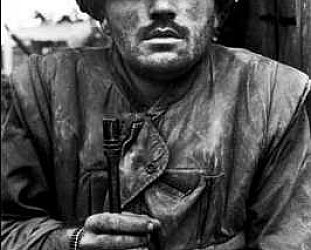Graham Reid | | 2 min read

In the tragically vast annals of war, the battle for Stalingrad stands out for the horrendous loss of life, the stubborness and arrogance of Adolf Hitler, the horrors that the German 6th Army endured imprisoned in that city, and the dreadful aftermath.
This award-winning, three-part documentary resiles from none of that and if it perhaps slightly marginalises some of the sufferings of the Russian people (although it does interview civilians also trapped in the city) it is no less horrific for that.
The previously victorious and confident German troops jaunted towards Stalingrad -- the city named for Hitler's arch-enemy -- and fully expected to take it within weeks. What the military hadn't counted on was the vigour with which the Russian army and people would defend the city. For the first time the Germans had to fight house-to-house and street-by-street, all the time being picked off by snipers.
The Russians also had been told of what a swathe of destruction the German's had wrought on their way, burned villages and towns, civilians deprived of homes, livelihood and lives . . .
Then winter came to the once-beautiful city on the Volga and the temperature dropped to -20 degrees. The snow was horizontal. Hitler ordered his army to stay, knock over the final pockets of resistance and take what little was left of the city.
But one million Russian troops arrived, encircled 250,000 Germans and a few thousand civilians, and for months they were trapped inside what the Germans called "the cauldron", albeit one knee-deep in snow.
The horrors then become unimaginable: German soldiers died from exposure, typhoid, dysentry; others went mad or committed suicide; many starved to death; they ate the dead horses, then the dogs, then the cats; others resorted to cannibalism . . .
And all the while Hitler back in Berlin kept the German people filled with propaganda about the glorious victory that was just about to be had, and refused to hear talk of defeat or surrender.
These gripping hour-long films -- the invasion, the entrapment, the aftermath -- tell this utterly unimaginable story through period footage (in colour and black'n'white, much of it shot by soldiers), through graphics and, most movingly, in the words of survivors, many of whom break into tears at the memory of just how appalling this was.
The statistics of the death toll are enough to have your shaking your head in bewilderment: 2500 Russians per day when the invasion started . . .
The aftermath is equally awful: Hitler wouldn't allow the wounded to return to Germany lest they reveal what had happened; the forced march of German soldiers to prison camps over the bodies of the dead; the camps where there were deaths counted in hundreds then thousands; those sentenced to work camps in remote Soviet provinces for 20 or 30 years (the last survivors were repatriated in 1955, a decade after the end of the war) . . .
History can be a cruel and tragic place to revisit, but we should do so repeatedly to remind ourselves of the human horrors of war, and how the ambition and single-minded vision of men brainwashed into believing their superiority can lead to such murderous actions.
One German prisoner recounts how he was treated in hospital by a Jewish doctor who had lost one arm in the siege of Moscow and had seen her children killed by the Germans. Yet here she was treating those who had done this to her and her family with patience and concern.
In a fim about the horrors of war this is a small but welcome light about the decency in humans. Most human in fact.
But after Stalingrad . . . it was on to Berlin for the Russian army where the retribution would be meted out in rape and murder.







post a comment